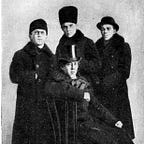Pidgin
Consider what effects, which might conceivably have practical bearings, we conceive the object of our conception to have. Then, our conception of these effects is the whole of our conception of the object.
- CS Peirce
This is pidgin. Not creole.
A need to communicate without access to formality. The formalization will first have to be organic, as we struggle to understand each other.
The struggle will lead to autonomy. Like a person weight lifting after a long period of training. As they struggle with the weights, their body will adjust by growing muscles that will lead to more control of the weights.
It’s more familiar to not depend on pidgin or the struggle of organic growth. Rather, it’s more methodologically accepted to form ourselves based on previously established formalities (traditions, dogma, culture, etc). So that we end up formalizing are own understanding through dogma before we try to understand each other.
The dogma is unifying and allows groups to form.
But this is pidgin.
You cannot reference your science or religion to understand this. This hasn’t been formalized yet. You can trivialize this using dogma. Beyond the dogma, nonsense exists only intelligible through the gaze of dogma.
It makes you feel. It makes you think. It makes you wander. It makes you doubt. While lacking formality and a disappearing certainty becoming more a memory.
A challenge to established values, Rorschach words twister around other biological input. The existential gardener of flags looks to plant its seeds in quicksand.
Before math, science, Kantian pragmatism. Peircean pidgin.
